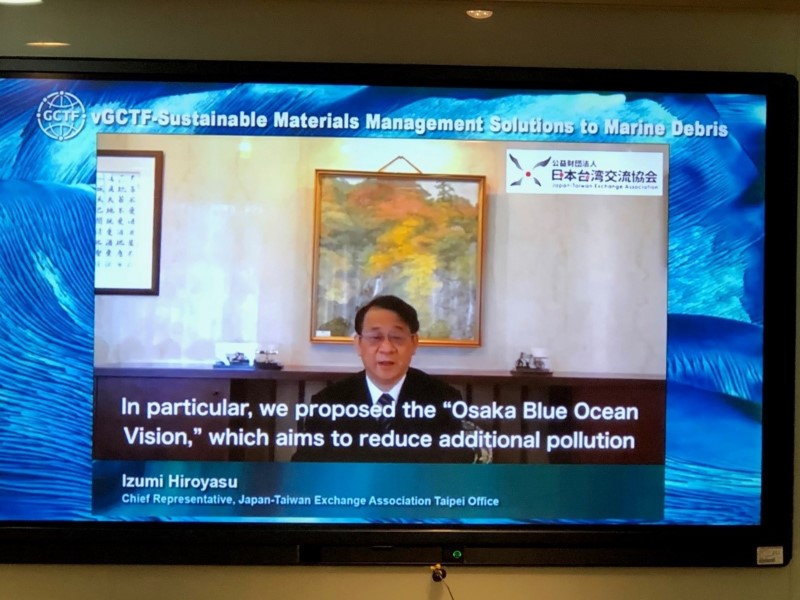
On November 3,2020, Chief Representative Hiroyasu Izumi gave an address at the opening ceremony of GCTF’s virtual workshop themed “Sustainable Resource Management–Solution to Marine Debris.”
At the G20 Osaka Summit hosted last year, the Japanese government promoted a variety of initiatives to be undertaken domestically and overseas in collaboration with the international community, such as advocating for the Osaka Blue Ocean Vision. At this workshop, the seventh virtual event this year, experts from various fields, including Japanese experts, gathered to examine and discuss solutions to these issues on November 3rd and 10th.
Website of the workshop
Chief Representative Izumi’s address
Distinguished guests,
On behalf of the Japan–Taiwan Exchange Association, I am delighted to co-host this virtual GCTF workshop on “Sustainable Materials Management Solutions to Marine Debris” with the Ministry of Foreign Affairs of Taiwan, the Ocean Affairs Council, the Industrial Technology Research Institute, the American Institute in Taiwan, and the Netherlands Office Taipei.
The oceans are common property. In order to continue to protect our beautiful ocean, it is essential that not just some countries and regions but the whole world should come together to work on it. Japan is committed to achieving the SDGs, and is promoting related efforts at home and abroad, including sustainable resource management. In particular, we proposed the “Osaka Blue Ocean Vision,” which aims to reduce additional pollution by marine plastic litter to zero by 2050, at the G20 Osaka summit hosted last year. We were able to share awareness of problem solving at the G20, which consists of the world’s major countries including emerging and developing countries.
Japan is now working on the realization of this vision. In Japan, we have been promoting the “Plastic Smart” Campaign, and we solicit a wide range of views not only from the government, but also from private sectors such as companies and institutions. By mobilizing diverse creativity and technical capabilities, we are advancing the all-Japan effort. We also have been actively working with the international community. With the help of bilateral ODA and international organizations, we will support the efforts of developing countries, such as ASEAN, from the aspects of capacity building and infrastructure development on waste management, and will keep working on the realization of this vision as a worldwide wave.
This is the first time the Netherlands joins Japan, the United States, and Taiwan in co-hosting a GCTF event, and it is extremely significant to be able to discuss the “Sustainable Materials Management Solutions to Marine Debris.” We will continue to utilize the framework of the GCTF and strive to actively contribute to various international issues. Last but not least, I would like to appreciate the efforts of all those who have facilitated the organization of today’s virtual GCTF workshop. Thank you very much.